If the book ‘History of SEO’ will ever be written, then, Google will probably be mentioned in its every page. Similar will be the case of game changing SEO updates. Google has time and again proved that it’s a company that has a place in far far future. But the search giant was not always this good at search, advertising, or launching self driven cars.
Google has worked restlessly to reach its present envious position. We all have seen Google evolve in the last one decade, and witnessed its glorious evolution. Some innovations introduced by Google however deserve special mention.
To keep things simple, we have categorized the evolutionary milestones in:
- Social Media
- Local Search
- Paid Search
- Web Spam
- SERPs
- Website optimization (ON-page)
- Analytics and Tracking
Let’s see how Google evolved, improved search, and changed SEO on the way, starting with the one we all love, that is Social Media!
Major Google innovations related to social media

Facebook might be the first name to pop up in our heads at mention of social media but the concept is older. Social media, like any other internet phenomena, took time to go mainstream, and become part of our everyday lives.
Google too recognized the influence of social media around 2005, and made it part of its search vision. Here are the major social highlights:
Images & videos in search results – The boring world of links and text focused search results pages got a major upgrade in 2007 with Universal Search. Social media profiles, images, videos and even maps started appearing in Google SERPs (search engine result pages). In October 2006, Google acquired YouTube, world’s largest online video site for $1.65 billion.
Google’s own social network – Realizing it must be part of the social future, Google launched its very own social media network, Google Plus on June 28, 2011. Presently, it has more than 300 million monthly active users, and is quickly creating its place amongst the giants like Facebook and Twitter.
Use of social signals as ranking factor – While Google didn’t take long to recognize the importance of social media related content, it was only in 2010 that it officially stated that it is considering social signals as ranking factor. This means data on Facebook, Twitter, and Google+ can influence your performance on Google result pages.
Preference to user generated content – Google understands that internet is powered by people rather than servers. Hence, it gave due importance to online channels where people create and share content. This is the reason why you see blogs, bookmarking sites, document sharing platforms, and discussion communities in search results. The year of high ranking user generated content also began in 2007 with Universal Search.
Outcome of Google’s social efforts
After Google started paying attention to social media, marketers too looked at it in a different light. People started thinking about optimization of:
- Content
- Images
- Videos
- Profiles
Google’s social acceptance opened up new opportunities to market products and made brands rethink their social presence.
Major Google updates related to local search

Google and its products are used all over the world (except China) but despite being one of the few truly global companies, it is a firm believer of ‘local’. For many years now, Google is trying hard to improve experience for local (region based) searches.
Here are the major local leaps Google made:
Local businesses on Maps – Google took its first concrete step towards localization of search in 2005. It came in the form of Google Maps that put small businesses on the search radar and laid down the foundation stone of local ecosystem & future services.
Local businesses in search – Two years after Maps, Google started showing local business information in organic search to answer queries with location factor. This could be called as first draft of the Great Local Search story Google is trying to write with regular updates.
Launch of Google Places – Making business sense of its local strategy, Google launched Google Places in April 20, 2010. Presently known as Google My Business, the product gave businesses the opportunity to take their business online for free, and get business mileage through ads at small investment.
Local focused algorithm updates – The unnamed algorithm update that influenced local search results across the globe came in July, 2014 and was codenamed Pigeon Update by Search Engine Land. The update made major improvements in distance and location ranking parameters. Google’s Hummingbird update, though about synonyms and context, also influenced local search results and benefited local businesses.
Google express advantage – Google confirmed that it stood beside small businesses in the ecommerce war with the announcement of Google Express on March 2013. The company is quickly expanding its same-day delivery service in the USA, giving a major sales boost to local stores and businesses.
Outcome of Google’s local efforts
Google’s local efforts made small and medium businesses aware about marketing opportunities in search results. Businesses with small budgets found a new way to connect with customers and generate sales. This introduced an otherwise uninterested set of people to:
- Internet ads
- Online promotion
- Branding
Major Google updates in Paid Search
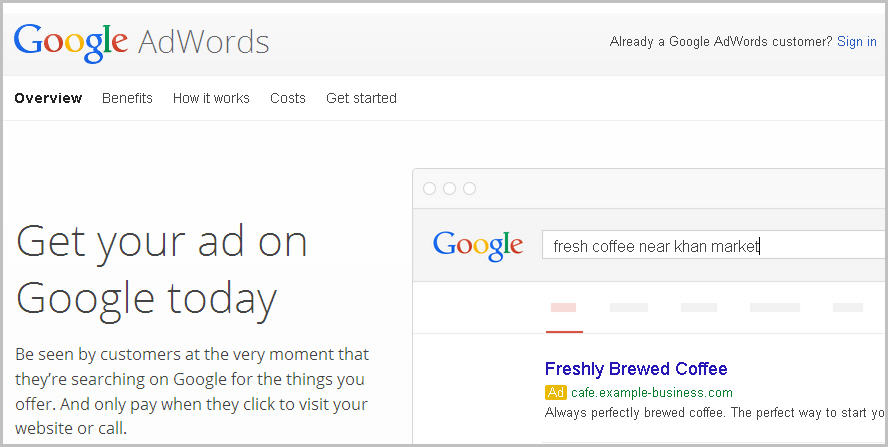
Every minute, 2 million searches are made on Google. To keep such behemoth search machinery going every second of the year costs a lot of money. It was in the year 2000 that Google started taking baby steps to generate ad revenue from its quickly growing search product.
Here are the major highlights of Google’s advertising journey:
First text ads – In the very first month of 21st century, Google introduced text ads that were sold on CPM basis. Google certainly was only testing the waters by selling ads through sales representatives. The product advertising service that will change its fortunes followed two years later.
Arrival of AdWords – Year 2002 marked the birth of Google’s main source of revenue, Google AdWords . It gave marketers the power to manage ad campaigns on their own. The service launch was monumental in itself as it changed the face of online advertising and search marketing. Google interestingly didn’t invent the pay-per-click auction model it presently works with. It was borrowed from Overture but never returned.
Evolution of AdWords – Google may have taken a cue from Overture for its PPC advertising model but the company deserves full marks for making it the mighty machinery it is today. Very soon it addressed the ad relevancy factor with click through rate. Year 2008 witnessed the arrival of Quality Score. Such regular updates made Google AdWords more bankable for advertisers.
Smart Remarketing – In March 2010, Google made it easier for advertisers to lure website visitors that left without purchasing. Remarketing not only gave marketers the opportunity to connect with potential buyers but also brought useful ads for internet users. While Google uses the Remarketing term, others use Retargeting for the same marketing technique.
Google AdSense launched – After monetizing its search engine through ads, Google turned to websites owned by others in June 18, 2003. By acquiring Applied Semantics, and rebranding it as Google AdSense, the company achieved that goal as well. It empowered website owners to make money through ads.
Above the fold update – Website owners eventually realized the money making potential of their online assets, and forgot about user experience. This led to clutter of ads and zero focus on content. Google addressed this ad menace in 2012 by penalizing websites that abused ads in above the fold. This was yet another step towards making websites fall in line with its guidelines.
Outcome of Google’s paid search
Google’s efforts in the field of advertising made Google more fascinating for marketers. Google services not only gave small businesses advertising platforms that didn’t ask for big investment but also gave major boost to:
- Online ad spending
- Advertiser confidence
- Performance driven marketing
Major Google updates in tracking
Advertisers and marketers are only concerned with return to their investment. To paint them a clearer picture, Google launched vast range of products and services in last 10 years. Below services were path breaking in terms of data analysis and management:
Google Analytics – Google AdWords excited marketers but they still need proof of its effectiveness. Google knew this and required a product to show that its advertising product made sense. Enter Google Analytics, a service that tracks and reports site traffic. Introduced in 2005, the service was result of multiple acquisitions and upgrades.
Universal Analytics upgrade – True to its evolution roots, Google was ready to give a major overhaul to Google Analytics in 2012. This upgrade came in the form of Universal Analytics that addressed a vast range of tracking, connectivity, ecommerce, and backend issues.
Google Webmaster Tools – While marketers are only concerned with returns, webmasters have other priorities as well. They like to keep a check on their website’s health. Google launched Google Webmaster Tools service for webmasters so that they can generate & analyze website data and make necessary changes.
AdWords editor, tracking apps and more – Google launched AdWords Editor for marketers managing large accounts with ease. In 2012 came another app named SDK for conversion tracking and remarketing. Shifting gears from desktop to mobile, Google introduced official Google Analytics mobile app for Android and iPhone users in 2012 and 2014 respectively.
Outcome of Google’s tracking efforts
Though challenging, tracking and data analysis is the key to running successful campaigns and
undertaking crucial site changes. In the last decade, Google has made data analysis and management less tiresome with platform additions, changes and apps. This lead to:
- Campaign performance measurement
- Boost in marketers’ confidence
- Simpler campaign management
- Mobility and engagement
Major Google innovations in web spam
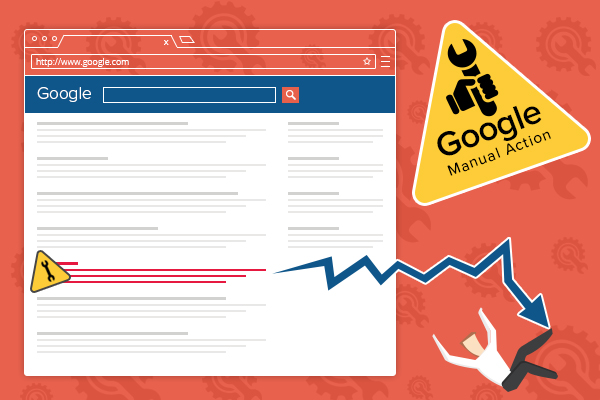
Spam not only ruined the quality of Google search results but also posed a major challenge to Google’s technological prowess. The firm headed some brutal attacks on web spam with updates like Boston, Florida, Cassandra, Jagger, and Bourbon. But Google declared full-fledged war with Panda and Penguin updates.
Let’s roll back the clock for some interesting tidbits:
Boston and other updates – If backlink data was crucial to counter future spam, hidden-text problem also needed immediate attention. Boston update of 2003 was targeted towards backlink data analysis. In the same year, Google addressed the hidden text issue with Florida and Cassandra.
Google Panda unleashed – After updates like Bourbon, Austin, and Jagger, Google set sky-high standards of content quality with Panda Update. The update witnessed in 2011 affected search results across the globe and made webmasters realize the importance of unique & quality content.
Exact match punishment – Few years ago, exact match domains had a very high chance of occupying topb positions in Google search results. This changed in 2012 when Google noticed the vile practice and took action to prevent poor quality sites from taking domain name advantage.
Attack of the Penguin – Year 2012 was noteworthy in Google’s action plan for web spam. It launched Penguin update to dilute value of backlinks and penalize webmasters indulging in black hat SEO techniques. Google also emphasized on brand building rather than obsessing over links.
Outcome of Google’s fight against web spam
Google’s commitment to address the plague of spam resulted in major change in the attitude of website owners. Penguin and Panda update not only made website owners think seriously about Google Guidelines but also started discussions on:
- Brand building
- Quality content
- User experience
More importantly, the fight against web spam checked the practice of Black Hat SEO.
Major Google innovations to improve UX of SERPs
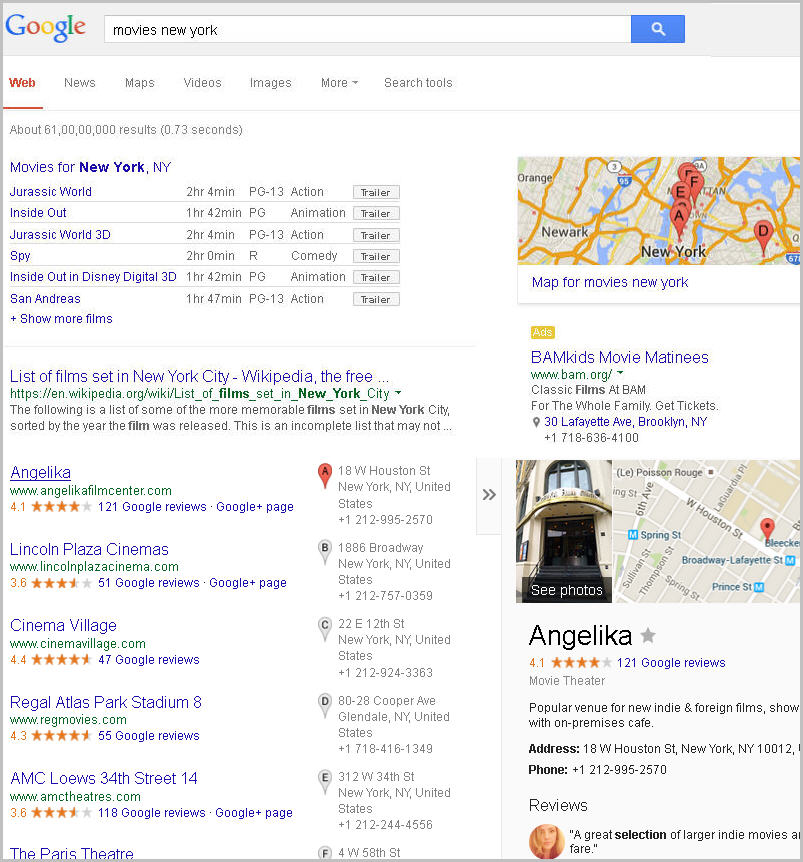 Click to Enlarge
Click to Enlarge
Google has changed a lot since 1998 but search is still its most valuable asset. This is the reason why Google is always making efforts to improve its search results. In the last 5 years, it has taken major leaps in returning result pages that answers queries without even clicking a link!
We have listed the most remarkable search result updates for you:
Introduction of Rich Snippets – Not every link that appears in search result page is helpful. Google realized this back in 2009, and introduced rich snippets (short summaries of the page) to help searchers identify the links that are worth a click.
Quicker results with Caffeine – Content was being generated at lightning pace, and with Caffeine update, Google tried to catch up. The new web indexing system enabled Google to return new and relevant content sooner than earlier.
The age of Knowledge Graph – Google eliminated the need to click on search results to get answers by introducing Knowledge Graph. The update came in 2012 and also addressed the language ambiguity during search. Check out this link to get to know Knowledge Graph!
Evolution of ads – Ads on search result pages have changed a lot in the last decade. From displaying ratings to almost merging into search results, Google ads have been going through their own evolutionary phase.
Google instant searches – From the day of its launch, Google’s team is working hard to make the search engine smarter. In September 08, 2010, it crossed a major milestone by announcing Google Instant that saved search time by showing results as you type.
Outcome of Google’s UX focused SERP efforts
Google today is wise enough to answer queries on its own, and has made the search process more humane. In addition to that, it has generated various other benefits such as:
- Quicker results
- Instant solution to queries
- Relevant results
Google updates regarding ON-Page Website Optimization
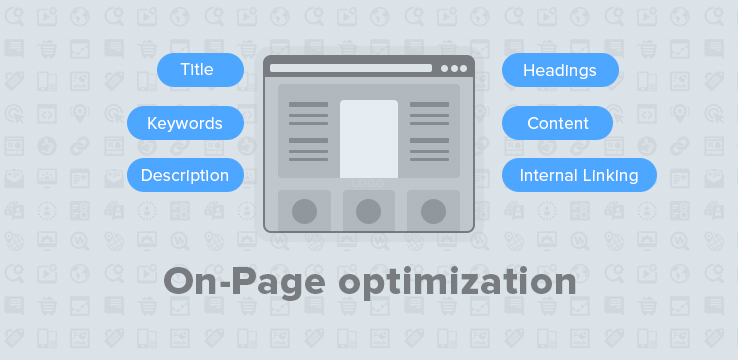
Google can only do so much in improving results without putting webmasters in line with its vision. Hence, it introduced algorithm changes and updates that put website owners to work. We bring for you the most notable ON-page changes announced by Google in the last one decade:
No follow tag – This link attribute though started for unmoderated content evolved into something bigger over time. With this tag, Google gave webmasters a way to distinguish paid and reference links from regular links.
Hreflang tag – Google has a reputation for identifying real problems faced by webmasters. Introduced in 2011, this tag solved the issue of irrelevant language pages in search results faced by websites that catered to international audience.
Arrival of Canonical tag – Duplicate content is sometimes unavoidable (think ecommerce sites with very similar products). Google acknowledged this in 2009 with the launch of canonical tag, giving website owners the power to mark duplicate content.
Rank with Page speed – While above two updates intended to protect websites from unwarranted ranking loss, making Page Speed a ranking factor was an incentive to create smarter websites. This brought a sea change in perception of website owners. Google also launched Page Speed Insight tool in 2013 to help webmasters discover actual site speed status.
Rank with HTTPs/SSL – Google realizes that webmasters love nothing more than higher ranking. Hence, it announced HTTP/SSL as ranking factor. With this step taken in 2014, Google gave preference to websites with enhanced security.
Outcome of Google’s troubleshooting efforts
Earlier, websites ranked by indulging in keyword stuffing, hidden text, and paid links but Google’s regular ON-page updates handled this situation very aptly. By stating ranking factors clearly and addressing genuine problems, Google made webmasters part of its big plan.
- Check on content duplicacy
- Page indexing control
- Content translation for multi location pages
- Better search results for mobile devices
Google and Years Ahead
Though Google has given us some remarkable products, search tools, and services, it didn’t tasted success in every project it undertook. Here are some Google projects that didn’t make business sense in the long run:
- Google Authorship
- Google Reader
- Page Rank
- Google Notebook
- Social media ventures like Buzz, Orkut, and Slide.com
Google pulled the plug on above listed products and their lesser known siblings. But this is true of every company under the sun; so, let’s not get much into that.
Google certainly did a lot more than we have wrote about in this post. Though we are sure we coveredall the major details under the covered sections, tell us if we missed something interesting.
Did you find this post helpful? Post a comment!
Facing difficulty in improving your ranking in search results?
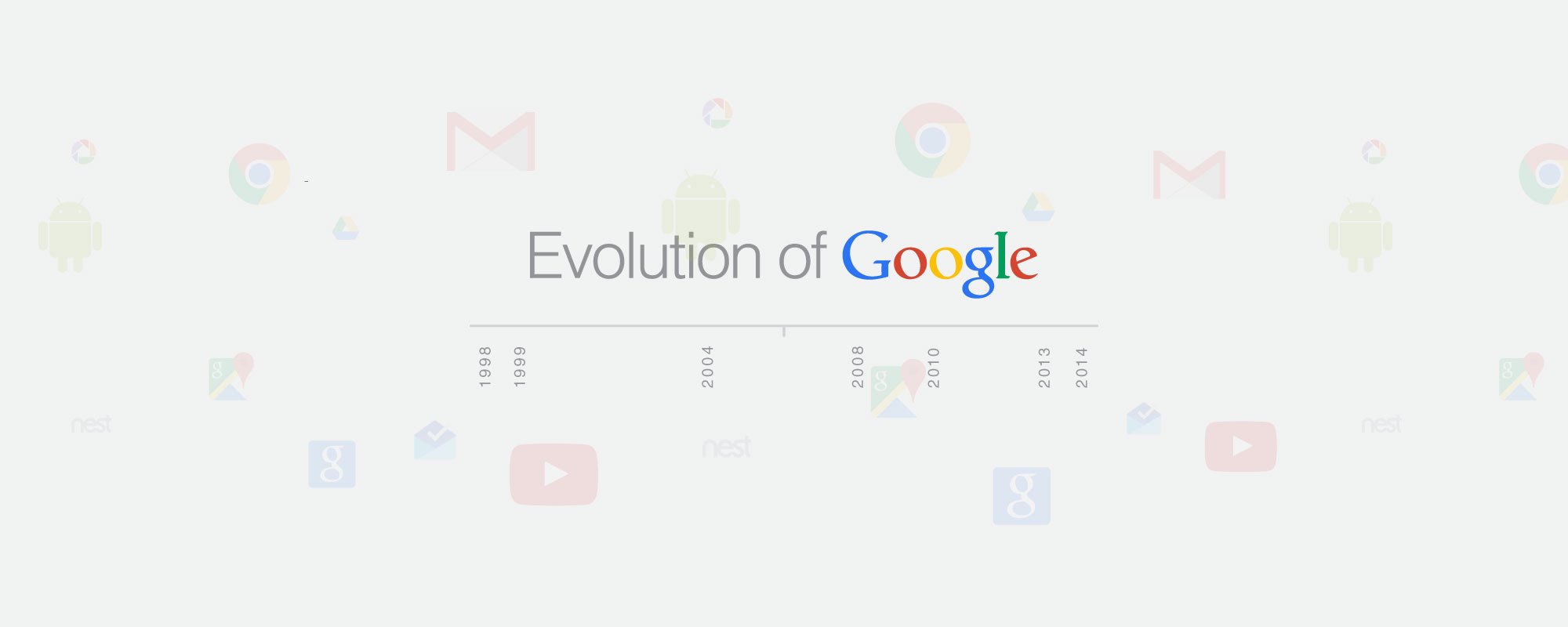






Comments (6)
 Suraj Lulla
Suraj Lulla
 FATbit Chef Post author
FATbit Chef Post author
 VATIC
VATIC
 FATbit Chef Post author
FATbit Chef Post author
 James
James
 FATbit Chef Post author
FATbit Chef Post author
SEO is really the key to drive in more sales
Yes, Suraj. SEO is really the key to drive traffic, and to increase sales for a business. To make SEO efforts more fruitful, webmasters need to work on other aspects too like website design, site structure, hierarchy, 404 errors, content etc. Glad you liked the post.
Thank you Varun for posting this article.It really helps me a lot in understanding the nuances of SEO.
I am glad our work is helping you understand SEO. Subscribe our newsletter to get notifications for every post!
Very nice blog, thanks for this post..it’s been good reading this.
Thanks for appreciating the post. Keep coming back for more such interesting posts.
Cheers